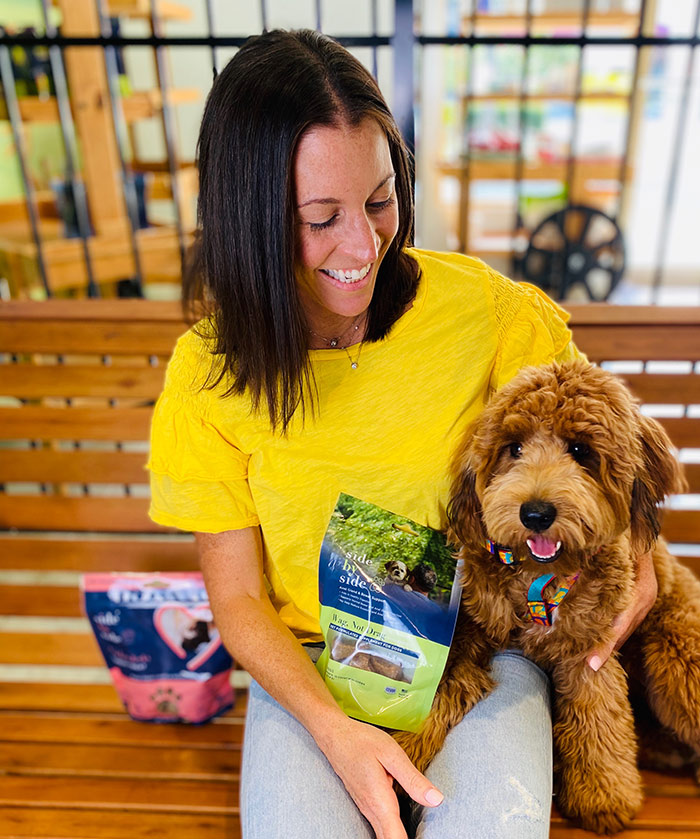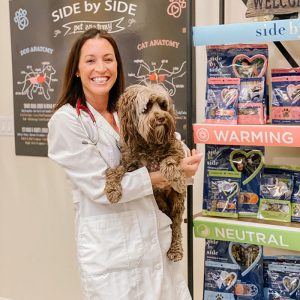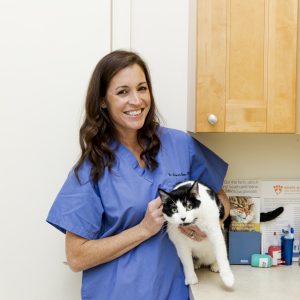
Your Pet is Healthy – But Here’s Why You Should Switch Their Food Anyway
Is your dog or cat generally healthy? Then you must be doing all the right things, right? Well, maybe…but there may be more you can do to prevent disease in dogs and cats. Don’t wait until your beloved pet has health concerns to make changes to their lifestyle. Small changes NOW can make a huge impact on your beloved pet’s overall health and wellness later in life.
As a veterinarian, far too often, I treat disease and illness that may have been prevented with some simple and easy lifestyle changes.
I always say that preventative medicine is the best medicine.
So today, I want to discuss some simple ways to implement a healthier lifestyle for your pet to help provide them with the best chance for a long life free of sickness. I also have some subtle signs and symptoms you may see with your pet at home to indicate a health issue.
8 Tips to Prevent Disease in Dogs and Cats
These 8 tips are the best way to keep your pets healthy and safe. Preventative veterinary medicine is always the best medicine. But catching and treating disease early is also crucial to a long healthy life. Check out some common symptoms to watch for after these preventative tips.
1. Feed your pet a high quality diet with the best ingredients.
When fighting most sickness and diarrhea in dogs and cats, this tip may be my single most important one I give pet parents. The diet you choose to feed your pet is imperative for creating a healthy, long life, free of disease.
Pet parents and veterinarians are becoming more aware of how unhealthy kibble-based diets can be on the overall health and life span of your pets. Kibble-based diets contain many artificial additives and preservatives. Kibble-based foods also lose their inherent vitamins, minerals, and other nutrients in the cooking process. The kibble is typically sprayed with synthetic nutrients to replace the nutrients lost in the cooking process.
You do not eat this way, so why should your pets?
At times, feeding your pet only whole food nutrition can be difficult. But it’s not an all or nothing situation. Your pet can experience amazing health benefits just from a cleaner diet.
Studies show feeding your pet just 25% real whole nutrition can decrease the probability of obesity. Pets rely on us to feed them what is appropriate and what is good for them. What you feed your pet is the fuel and energy they need for not only survival but also their overall health and wellbeing.
While many foods will provide and meet the basic requirements to sustain life, higher quality foods will result in optimal health for your pet. It is our responsibility as their parents to make the right choices for them.
Side By Side Pet Food is a whole food based diet that sources the highest quality ingredients. The food is cooked at the lowest temperature and for the shortest amount of time so that it does not lose the inherent nutrients from the ingredients. This method is unique from traditional kibble-based diets where ingredients are run through an extrusion process for four hours at very high temperatures to create the kibble.
Side By Side Pet Food does not use any artificial additives, preservatives, colorings, or added nutrients. All nutrients are derived from the inherent ingredients. It meets all AAFCO requirements for complete and balanced recipes.
I always recommend feeding your pet whole food nutrition with higher quality ingredients, and no artificial additives or preservatives.
2. Control your pet’s weight.
Overweight pets are more prone to diabetes and other diseases. In addition, our aging pets tend to have a difficult time moving around and can develop degenerative joint disease.
To keep your pets healthy, make sure they maintain a healthy BCS (Body Condition Score), and feed them a high quality whole food nutrition based diet. They depend on us!
3. Use natural supplements for joint health, skin health, and cardiac health.
I love glucosamine and chondroitin sulfate as well as omega 3 fatty acids. I recommend my pet parents start their pets on these supplements at a very young age. Speak to your veterinarian regarding the specific health benefits and what dose your pet needs.
4. Take your pet to the veterinarian at least once per year.
Detecting disease and subtle changes early is crucial in providing a long healthy life for your pet. Animals cannot tell us when they feel ill. Dogs will communicate a little, but cats will not show you that they are sick until they are very ill.
When pets come into my veterinary hospital with obvious signs of illness, many times they are at the end stages of a disease. There is not much we can do at that point.
But you can stave off many complications just by making sure your pets see a veterinarian at least once or twice per year. We may be able to detect things that pet parents do not notice.
Annual blood work is also important for catching and treating disease early. A veterinarian’s physical examination gives us an overall idea about your pet’s health, but blood work will better detect organ function and certain diseases. At my animal hospital, I recommend a blood profile once per year.
5. Maintain your pet’s dental health, and have their teeth cleaned professionally.
Periodontal disease is the most overlooked disease in pets and can cause significant health problems.
Imagine if you never brushed your teeth. Our pets are no different.
Although we highly recommend it, most pet parents do not actively brush their dog’s or cat’s teeth. But they are still susceptible to the EXACT same diseases caused from poor dental hygiene as humans, such as cardiac disease, diabetes, and systemic illness. Take care of their teeth in order to keep your pets healthy!
6. Know the common emergencies that need immediate veterinary attention.
Often, people cannot distinguish when their pet needs to be seen immediately by a veterinarian or if an issue can wait. Illness and infection in dogs and cats can be difficult to diagnose. As always, I tell my clients to go with their instinct. If you are worried and not sure, never hesitate to have your pet evaluated by a veterinarian.
7. Maintain good mental health with proper exercise and socialization.
Just like us, a healthy and stable mental health is imperative to a long healthy life, free of disease. It is well documented that high levels of stress can lead to releasing excess cortisol, which may cause a multitude of diseases and strain on the body.
Pets need proper socialization, attention, and exercise. Make sure to schedule daily time for adequate exercise and socialization with people and other pets. If your pet is exhibiting signs of anxiety (panting, pacing, clingy behavior, shaking, vocalizing) have them evaluated by your veterinarian. There are many things we may recommend to make sure your pet is free of stress and anxiety.
8. Pick up on subtle signs that may indicate disease.
As mentioned earlier, detecting disease early is crucial in the treatment and health of your pet. Many times, pet parents do not realize that their pet may be showing signs of disease. The following are some mild sick dog symptoms that may indicate your pet should be evaluated by their veterinarian:
- Excessive panting
- Slower to stand up and move around
- Changes in eating or drinking habits
- Changes in urinating or defecating
- Sleeping more
- Seeking out different areas to sleep and rest
- Changes in weight
- Changes in activity level (not wanting to walk or play as long) or behavior (becoming more clingy or less clingy)
Final Thoughts to Prevent Disease in Dogs and Cats
Staying tuned in to your pet’s health is the key to preventing any illnesses or complications. As pet parents, we are the only thing that stands between our pets and their ultimate wellbeing.
It is up to us to give our furbabies the healthiest lives possible. Our pets depend on us to make the right choices for them and to keep them healthy and strong. You can prevent disease in your dogs and cats. They give us so much love, devotion, and loyalty, so let’s give them health, happiness, and a long wonderful life!




